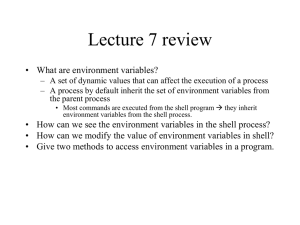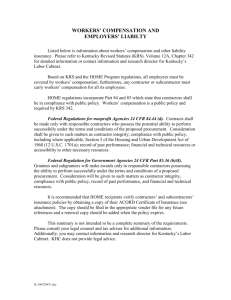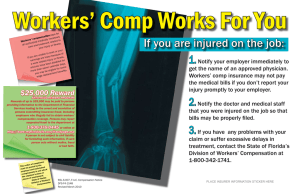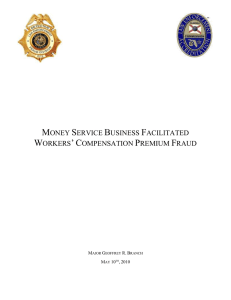Money Service Business Facilitated Workers’ Compensation Premium Fraud Background:
advertisement
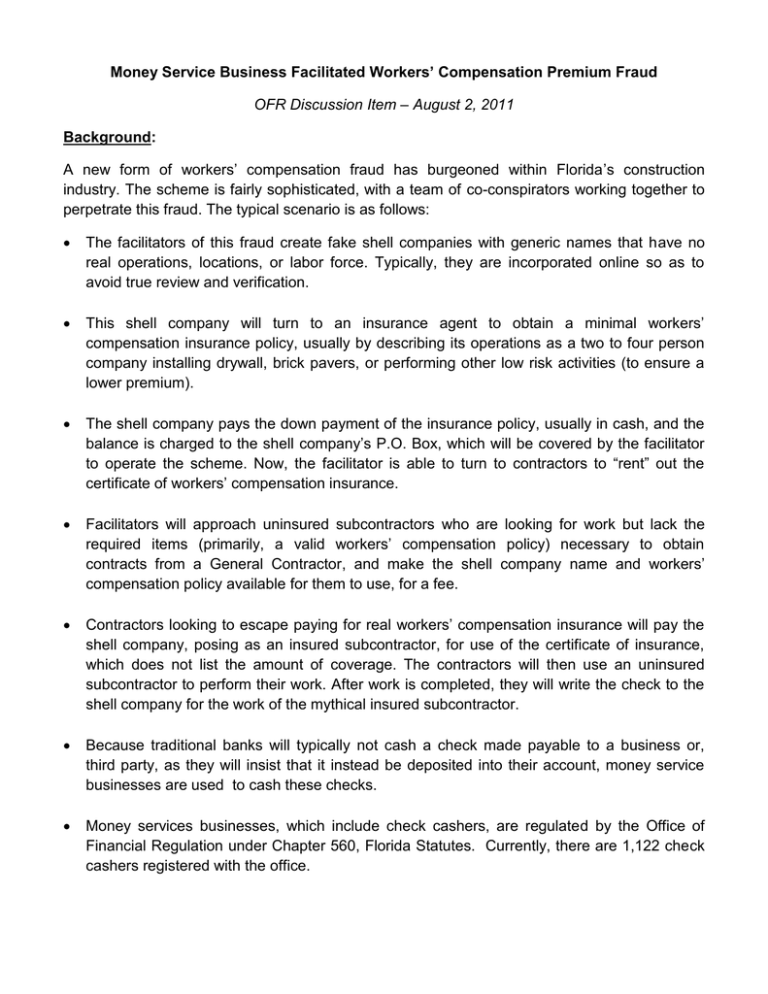
Money Service Business Facilitated Workers’ Compensation Premium Fraud OFR Discussion Item – August 2, 2011 Background: A new form of workers’ compensation fraud has burgeoned within Florida’s construction industry. The scheme is fairly sophisticated, with a team of co-conspirators working together to perpetrate this fraud. The typical scenario is as follows: The facilitators of this fraud create fake shell companies with generic names that have no real operations, locations, or labor force. Typically, they are incorporated online so as to avoid true review and verification. This shell company will turn to an insurance agent to obtain a minimal workers’ compensation insurance policy, usually by describing its operations as a two to four person company installing drywall, brick pavers, or performing other low risk activities (to ensure a lower premium). The shell company pays the down payment of the insurance policy, usually in cash, and the balance is charged to the shell company’s P.O. Box, which will be covered by the facilitator to operate the scheme. Now, the facilitator is able to turn to contractors to “rent” out the certificate of workers’ compensation insurance. Facilitators will approach uninsured subcontractors who are looking for work but lack the required items (primarily, a valid workers’ compensation policy) necessary to obtain contracts from a General Contractor, and make the shell company name and workers’ compensation policy available for them to use, for a fee. Contractors looking to escape paying for real workers’ compensation insurance will pay the shell company, posing as an insured subcontractor, for use of the certificate of insurance, which does not list the amount of coverage. The contractors will then use an uninsured subcontractor to perform their work. After work is completed, they will write the check to the shell company for the work of the mythical insured subcontractor. Because traditional banks will typically not cash a check made payable to a business or, third party, as they will insist that it instead be deposited into their account, money service businesses are used to cash these checks. Money services businesses, which include check cashers, are regulated by the Office of Financial Regulation under Chapter 560, Florida Statutes. Currently, there are 1,122 check cashers registered with the office. The check casher takes out a legally authorized fee between 1.5% and 2.0% for the service of cashing the check. A check casher that is part of the conspiracy takes out an additional fee between 6%-8% for the facilitator as the fee for use of the shell company name and its workers’ compensation insurance policy. The cash, minus the fees, is either given back to the General Contractor, who will then pay his uninsured subcontractor or employees in cash, or, it goes straight from the Money Service Business or the facilitator to the uninsured subcontractor who performed the work, effectively avoiding the payment of any workers’ compensation premiums or applicable payroll taxes on these monies. The money paid to the shell company in this manner is not reported to the shell company’s insurance carrier, nor are the payments considered payroll exposure because, on paper, this transaction appears to be a legitimate contractor to insured subcontractor payment. Aggressive facilitators will duplicate this scheme, often with the same workers’ compensation insurance policy, time and time again. When they fear detection, they fold the shell company and form a new one. Because the shell company often contained fictitious information or an owner that either does not exist or is illegally in the country, it is tremendously difficult to track this crime. General contractors who are questioned about their involvement in the scheme show fraud investigators the certificate of insurance given to them, and state that they knew nothing of the scheme, successfully “hiding” behind the rented certificate. There are cases in which the shell company is run by the money services business itself, who acts as a full-service operation for contractors looking to take advantage of this scheme. The motivation for contractors is enticing: uninsured subcontractors can save at least 20% by avoiding actual workers’ compensation premiums, and therefore are able to pass that cost savings on to general contractors complicit in this fraud. Contractors and subcontractors who are in full compliance with the state's workers' compensation insurance laws are placed at a significant competitive disadvantage because they are unable to quote prices anywhere close to those contractors who are knowingly engaging in activities to circumvent the law. The effects on the State of Florida’s bottom line are considerable. Any time fraud that makes it easier for contractors to pay workers under the table in cash avoids significant tax collections by the state. Additionally, when an uninsured worker is injured, the costs of care for catastrophic injuries are borne by all taxpayers.

